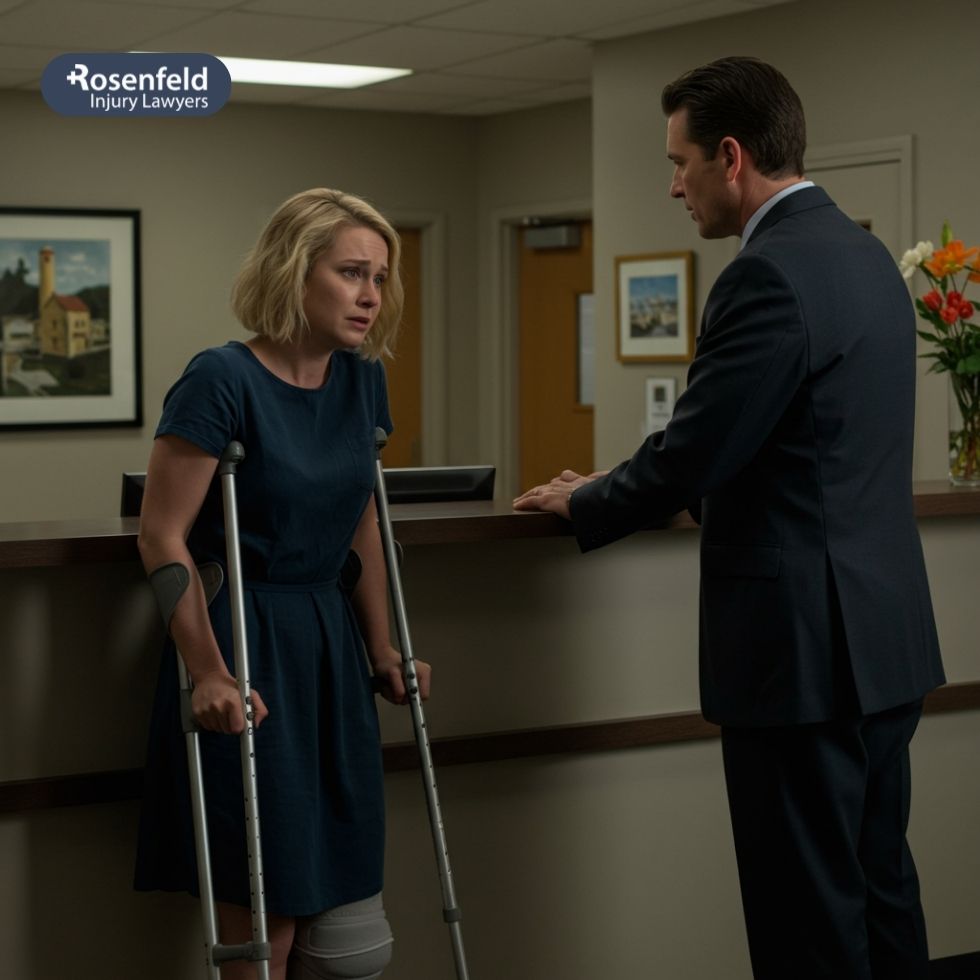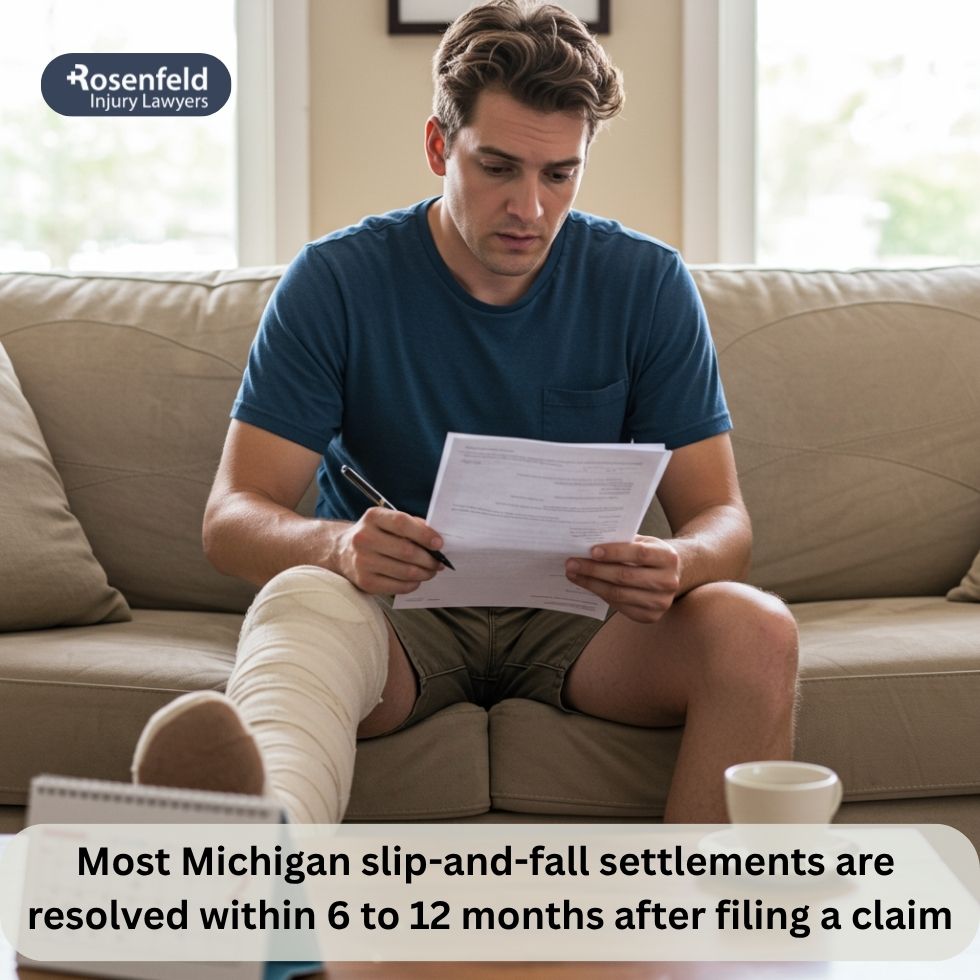How Long Do Slip and Fall Settlements Take in Illinois?
Clients frequently ask our attorneys, “How long do slip and fall settlements take?” While there are general timelines, your specific claim will vary on factors such as the available evidence and the at-fault parties.
Whether you were injured on icy steps along the Chicago River or fell down a staircase in a Wrigleyville apartment, our experienced attorneys can help set realistic expectations for your settlement timeline and speed up the process through careful negotiations. Contact us today for a free consultation about your slip and fall case.

What Does the Slip and Fall Settlement Process Include?
Before getting started on your claim, you must seek medical treatment, gather evidence at the accident scene, and file a police report if necessary. This will document your case and make it easier to seek compensation.
Your slip and fall settlement timeline starts as soon as you consult with a personal injury attorney. This process involves filing the claim, receiving a response from the insurance company, establishing liability, and potentially filing a slip and fall lawsuit.
Filing the Claim
To begin, you will file an insurance claim with the property owner’s insurance company. This is not the same as a lawsuit, which starts by filing a complaint with the proper court.
You’ll need to ask the property owner for their contact details and policy number. Every insurer has a slightly different claims process, but most will request basic details like your contact information, the property owner’s name, a summary of the accident, and evidence of your expenses like medical bills and lost wages.
Case Investigation & Policy Review
The insurance company will begin to investigate your case and identify any policy exclusions that may lead to your claim being denied. Insurance adjusters will review your medical expenses and determine the responsible parties. This process can take a few weeks, but insurance companies must respond within 60 days or explain the reason for the delay (Part 919.80(b)(3)).
If the insurance company refuses to offer a fair settlement, then our attorneys will proceed to the next step.
Sending Demand Letter
A demand letter for a slip and fall claim informs the insurance company of what we believe is fair compensation based on your medical costs, lost wages, and pain and suffering. Working with a skilled attorney can significantly affect whether you receive a fair settlement agreement, as we are highly familiar with what would be appropriate compensation in a slip and fall case like yours.
Once the insurance company receives the demand letter, settlement negotiations can begin. The company will return with a counteroffer, and we will decide whether this is a fair settlement. If not, settlement negotiations continue until you are satisfied or until the insurance company refuses to continue negotiating.
Filing a Slip and Fall Lawsuit
Our law firm will file legal documents with the appropriate court, such as the Circuit Court of Cook County. The responsible parties and their insurance agents will receive a summons. The court schedules the trial, and we begin pre-trial proceedings, such as taking depositions from witnesses, filing motions to extend discovery dates, or requesting additional information from the other parties.
Many cases settle before the trial date. You will sign a settlement agreement that outlines what the insurer is willing to pay you and states that you agree not to ask for more compensation later on.
Paying Outstanding Bills
Any outstanding bills, especially medical liens, will be the first thing covered by your settlement. These will be paid directly to your health insurance or the medical provider.
Compensation Payout
Once all medical care has been covered, you will receive your settlement for things like lost income or pain and suffering
. Your attorney fees and other bills will be deducted from your settlement. You can either receive a lump sum payment or a structured settlement depending on your needs.
Which Factors Affect the Slip and Fall Case Timeline?
The slip and fall claim process can take anywhere from a few months or even years. Several factors determine the settlement timeline, including state law and how serious your slip and fall accident was.
Statute of Limitations
Illinois has a two-year statute of limitations for personal injury claims (735 ILCS 5/13-202). In cases involving minors or disabled individuals, the statute of limitations is tolled, or paused, until they reach the age of majority or are capable of filing.
If you miss this deadline, you cannot file a slip and fall claim. Contact an experienced personal injury attorney as soon as possible to ensure we can begin negotiations.
Involvement of Multiple Parties & Liability Disputes
Liability is the basis of a personal injury lawsuit, and it means that the other party was primarily responsible for your life-altering injuries. Illinois uses a comparative negligence doctrine, meaning that there can be multiple liable parties (735 ILCS 5/2-1116). You can seek compensation as long as you are not more than 50% responsible.
In some cases, there is unclear liability. One example is the Illinois Supreme Court case Murphy-Hylton v. Lieberman Management Services, where a property management company was held liable for a slip and fall case on an icy sidewalk.
Illinois shields property owners from liability for natural accumulation of ice (745 ILCS 75/2), but it was determined that the company was liable because the defective sidewalk made conditions more dangerous.
Yet, the Chicago Municipal Code mandates snow and ice removal (4-4-310 & 10-8-180). This shows the complex interplay between state and municipal ordinances, making it crucial that you work with a skilled attorney familiar with these nuances.
These more complex claims may need to be appealed in court if the verdict is unfavorable, which significantly increases the timeline.
Collecting Evidence to Prove Fault
Having detailed records of your injuries and testimony from medical professionals can help ensure that you receive maximum compensation. For example, you will need medical records, proof of lost income, photos of the accident scene, witness statements, maintenance records, and sometimes surveillance footage or expert testimony.
If the slip and fall accident happened in a secluded area, such as in an alleyway with no witness or surveillance footage, an experienced personal injury attorney will need to collect evidence to prove the accident happened and who was responsible.
Serious Injuries & Medical Treatment Duration
In general, insurance companies and personal injury lawyers want to wait until you reach Maximum Medical Improvement (MMI) before starting settlement negotiations, as this ensures that your medical bills can be properly tabulated.
Slip and fall cases with more severe injuries will take longer to resolve because the victim requires ongoing medical care, and medical providers must determine what additional treatments they may need. Those with catastrophic injuriesmay have very high medical bills, and insurers will spend more time arguing about what treatments are necessary than those with moderate injuries.
Pre-Existing Medical Conditions
Insurers will use any medical conditions you have to prove that the slip and fall accident was not their fault. For example, if you have low vision and fall in the brightly light Chicago Pedway, the insurer will claim that the accident wouldn’t have happened if you didn’t have that medical condition.
Our experienced attorneys will use your medical records and expert testimony to demonstrate that while your medical conditions may have contributed to the slip and fall accident, they were not the primary cause.
Settlement Negotiations
The insurer’s willingness to negotiate plays a crucial role in your settlement timeline. An insurance agency that is aware it will lose in court will be more willing to settle quickly, while one that believes it has a strong enough legal argument will deny your claim or try to negotiate down.
An experienced attorney will both set realistic expectations for how much you can receive and push for the highest possible compensation based on the scope of your injuries and the available evidence. However, the more counteroffers we consider, the longer the settlement process.
Trial Proceedings
Most slip and fall cases settle out of court. However, sometimes settlement negotiations fail, and we must file a lawsuit. This increases the timeline because court dates are set months or even years in advance.
The actual trial process generally only takes a few weeks, but the pretrial proceedings can take a few months or longer. Our law firm must coordinate with both the court system and others involved in the case, particularly with the discovery process.
Discovery involves sharing all information that we have gathered with all the parties in the lawsuit so that everyone can develop arguments based on the same evidence.
In cases with complex liability issues or multiple parties, the process will take longer because we must coordinate with the court and the defendants.
Slip and Fall Timeline Examples
Your experienced slip and fall lawyer will keep you updated on when you can expect to be compensated. While your specific timeline will vary, these are general guidelines for how long your case may take.
A Few Months (3-6 Months): This is more common for cases with clear liability and minor injuries. The settlement process is expensive and time-consuming for insurers, so they will offer to settle quickly.
Six Months to a Year: If you require ongoing medical treatment, such as physical therapy or multiple surgeries, insurers will want to wait until you reach maximum medical improvement before settling. This timeline may also happen if there is more than one liable party or if there is insufficient evidence.
A Year or More: If you have to file a lawsuit or there are significant disputes about liability, then your case will take longer. This is also more common for more serious injuries where you require multiple surgeries, long-term care, or intensive therapy.

How Our Chicago Slip and Fall Lawyers Can Help
Our firm will set realistic expectations for when you can expect treatment while giving you the best possible chance at fair compensation. We can assist you with the following aspects of your case.
- Liability: To receive a settlement, you must show that a certain party is more liable for your accident. We’ll identify the liable parties, such as a property owner or maintenance company, and use case precedent to prove why they are responsible.
- Case Valuation: Based on your injuries and treatment needs, we will identify a fair sum that includes all future needs and non-economic damages like pain and suffering.
- Investigation: Clear evidence will speed up the settlement process, as it establishes liability. We will use our resources to find compelling evidence and demonstrate how your medical treatment is connected to your accident.
- Demand Letter and Negotiation: We will write a compelling letter to the insurance company demonstrating how their policy covers your accident and why the insured individual is liable. We will also assess any offers to determine whether they are fair.
- Trial Representation: While your case is likely to settle out of court, we may need to file a lawsuit and take your case to trial. In this case, we will communicate with all third parties, file motions, interview witnesses, and share your story in court.
Consult Our Law Firm Today!
How long a slip and fall settlement takes is highly case-specific, making it essential that you speak to a top-rated attorney. Our firm is a member of the Million Dollar Advocates Forum and has a 10/10 AVVO rating, proving our skill in both negotiation and litigation.
We work on a contingency fee basis, meaning you owe us nothing unless we earn you compensation. Contact us today for a free consultation about your legal rights.
Content reviewed by Chicago slip and fall accident lawyer Jonathan Rosenfeld of Rosenfeld Injury Lawyers LLC, who holds property owners and management companies accountable to obtain justice for injured visitors and tenants, and is a trial lawyer recognized by Super Lawyers, Lawyer Legion, and Distinguished Justice Advocates for premises liability litigation.







